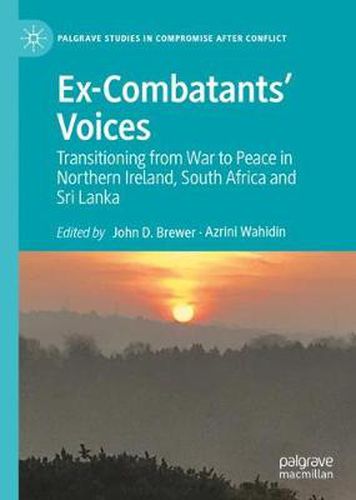Readings Newsletter
Become a Readings Member to make your shopping experience even easier.
Sign in or sign up for free!
You’re not far away from qualifying for FREE standard shipping within Australia
You’ve qualified for FREE standard shipping within Australia
The cart is loading…






This title is printed to order. This book may have been self-published. If so, we cannot guarantee the quality of the content. In the main most books will have gone through the editing process however some may not. We therefore suggest that you be aware of this before ordering this book. If in doubt check either the author or publisher’s details as we are unable to accept any returns unless they are faulty. Please contact us if you have any questions.
This book develops the discourse on the experiences of ex-combatants and their transition from war to peace, from the perspective of scholars across disciplines. Ex-combatants are often overlooked and ignored in the post-conflict search for memory and understanding, resulting in their voice being excluded or distorted. This collection seeks to disclose something of the lived experience of ex-combatants who have made the transition from war to peace to help to understand some of the difficulties they have encountered in social and emotional reintegration in the wake of combat. These include: motivations and mobilizations to participation in military struggle; the material difficulties experienced in social reintegration after the war; the emotional legacies of conflict; the discourses they utilize to reconcile their past in a society moving forward from conflict toward peace; and ex-combatants’ subsequent engagement - or not - in peacebuilding. It also examines the contributions that former combatants have made to post-conflict compromise, reconciliation and peacebuilding. It focusses on male non-state actors, women, child soldiers and, unusually, state veterans, and complements previous volumes which captured the voices of victims in Northern Ireland, South Africa and Sri Lanka. This volume speaks to those working in the areas of sociology, criminology, security studies, politics, and international relations, and professionals working in social justice and human rights NGOs.
$9.00 standard shipping within Australia
FREE standard shipping within Australia for orders over $100.00
Express & International shipping calculated at checkout
This title is printed to order. This book may have been self-published. If so, we cannot guarantee the quality of the content. In the main most books will have gone through the editing process however some may not. We therefore suggest that you be aware of this before ordering this book. If in doubt check either the author or publisher’s details as we are unable to accept any returns unless they are faulty. Please contact us if you have any questions.
This book develops the discourse on the experiences of ex-combatants and their transition from war to peace, from the perspective of scholars across disciplines. Ex-combatants are often overlooked and ignored in the post-conflict search for memory and understanding, resulting in their voice being excluded or distorted. This collection seeks to disclose something of the lived experience of ex-combatants who have made the transition from war to peace to help to understand some of the difficulties they have encountered in social and emotional reintegration in the wake of combat. These include: motivations and mobilizations to participation in military struggle; the material difficulties experienced in social reintegration after the war; the emotional legacies of conflict; the discourses they utilize to reconcile their past in a society moving forward from conflict toward peace; and ex-combatants’ subsequent engagement - or not - in peacebuilding. It also examines the contributions that former combatants have made to post-conflict compromise, reconciliation and peacebuilding. It focusses on male non-state actors, women, child soldiers and, unusually, state veterans, and complements previous volumes which captured the voices of victims in Northern Ireland, South Africa and Sri Lanka. This volume speaks to those working in the areas of sociology, criminology, security studies, politics, and international relations, and professionals working in social justice and human rights NGOs.